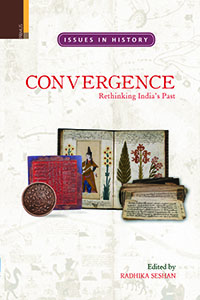
INFORMATION
- EDITOR : Radhika Seshan
- HB ISBN : 978-93-80607-05-4
- Year : 2014
- Extent : xii + 134
- Discount available on checkout
- Usually dispatched within 3 to 5 working days.
Convergence
| HB ₹ 695 . $ . ₤ |
PB ₹ . $ . ₤ |
|
| POD ₹ . $ . ₤ |
e-Book ₹ . $ . ₤ |
INFORMATION
- AUTHOR –
- ISBN – 978-93-80607-05-4
- Year – 2014
- Extent: 400 + 40 coloured illustrations
- 10% discount + free shipping
- Usually dispatched within 3 to 5 working days.
Convergence: Rethinking India’s Past explores the multiplicity of sources that can be used for studying Indian history. Texts, literature, inscriptions, and other sources have long been but the fountainheads of history. The contributors to this volume, however, begin with the premise that such sources, in the true spirit of historical research, need to be re-interrogated. Without ignoring questions of the validity of a source, they also emphasize the hybridity and range of material that can be used as a historical source. Starting, therefore, with the idea of ‘re-search’, Convergence examines sources that have so far been used, before proceeding to study newer ones that have yet to be utilized. Keeping this in mind, it re-examines the better known sources, such as Portuguese, French and English factory records, travel accounts, Chinese texts, and also maps, travel accounts, Tibetan and Japanese sources.
The Editor
Radhika Seshan is Associate Professor, Department of History, University of Pune. Her latest publication is Ideas and Institutions in Medieval India, Eighth to Eighteenth Centuries (2013). Her areas of interest include the economic history of medieval India, in particular maritime history. In recent years, Radhika has begun to focus on urbanization and maritime history, through studies of the ports of the Indian peninsula.
Convergence: Rethinking India’s Past explores the multiplicity of sources that can be used for studying Indian history. Texts, literature, inscriptions, and other sources have long been but the fountainheads of history. The contributors to this volume, however, begin with the premise that such sources, in the true spirit of historical research, need to be re-interrogated. Without ignoring questions of the validity of a source, they also emphasize the hybridity and range of material that can be used as a historical source. Starting, therefore, with the idea of ‘re-search’, Convergence examines sources that have so far been used, before proceeding to study newer ones that have yet to be utilized. Keeping this in mind, it re-examines the better known sources, such as Portuguese, French and English factory records, travel accounts, Chinese texts, and also maps, travel accounts, Tibetan and Japanese sources.
The Editor
Radhika Seshan is Associate Professor, Department of History, University of Pune. Her latest publication is Ideas and Institutions in Medieval India, Eighth to Eighteenth Centuries (2013). Her areas of interest include the economic history of medieval India, in particular maritime history. In recent years, Radhika has begun to focus on urbanization and maritime history, through studies of the ports of the Indian peninsula.




